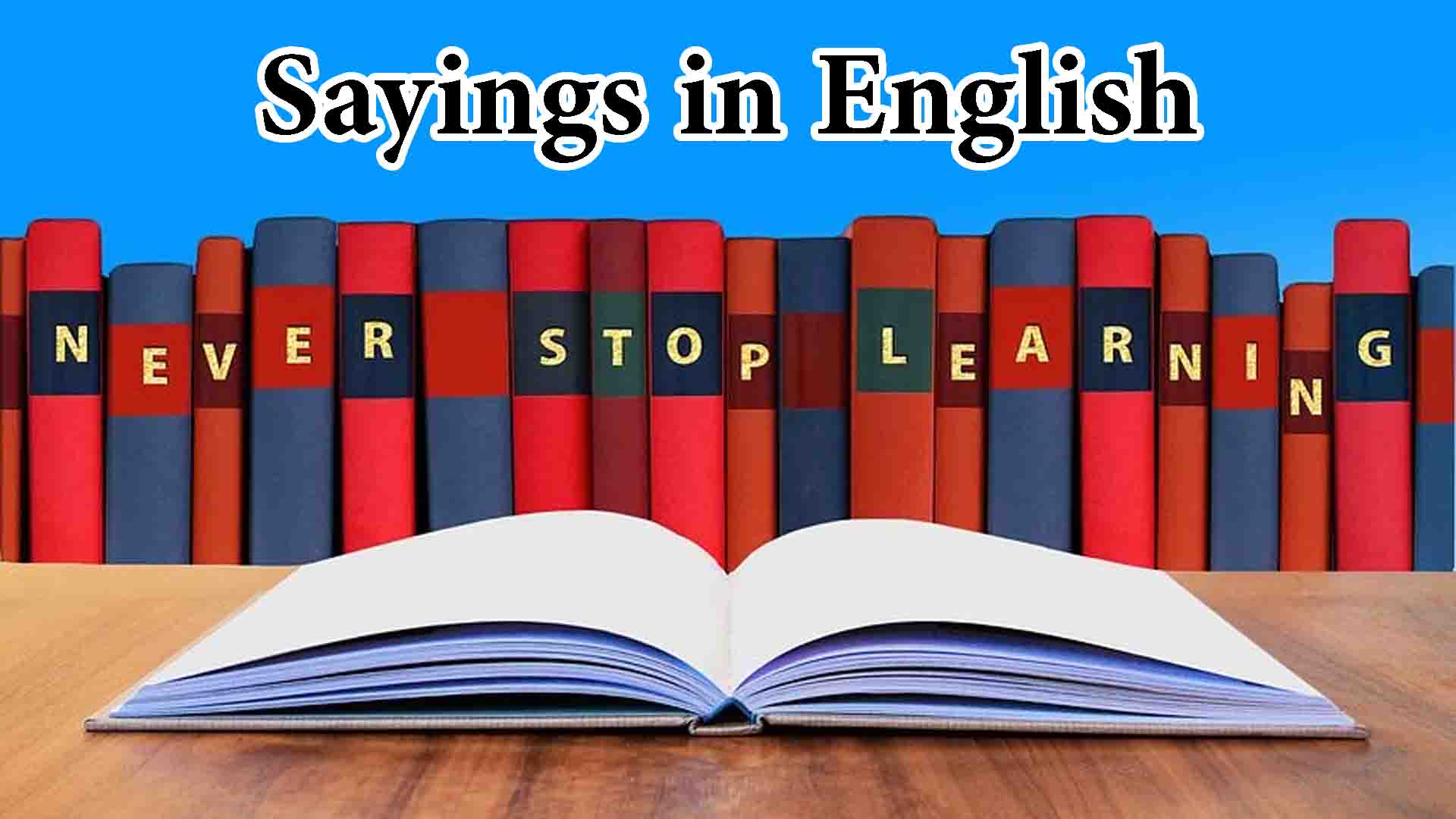Sayings
Enjoy these proverbs that we have compiled for you in Primary World, the best of each popular proverb, ready for you to have at your disposal.
QUICK ACCESS
| ANIMAL SAYINGS | SPANISH SAYINGS |
| FUNNY SAYINGS | SAYINGS FOR CHILDRENS |
| SHORT SAYINGS | MEXICAN SAYINGS |
| SAYINGS OF LIFE | LOVE SAYINGS |
| SAYINGS IN ENLIGHS | POPULAR SAYINGS |
Sayings and proverbs with their meaning
We have categorized these sayings for children according to their origin, from the popular ones that we all know to the funniest ones, going through those that talk about life, that are specific to a specific region or those that are in English.
Each and every one of these sayings and their meaning are prepared for you to read in a simple way, so get ready to have a good time.
They are a great exercise in reading, concentration and memory, as well as a good way to understand some linguistic figures and to delve into language as a vehicle for understanding the environment, history and cultural traditions.
They are born to advise, teach and warn. There are types for each situation of daily life, so it is very important for children to know them, since it helps them to know the point of view, the traditions and customs of our ancestors.
The also called sayings are sentences that try to express a moral or teaching through a short phrase, and usually with a figurative meaning. In addition, they are drawn from experience and speculation, that is, it is popular wisdom expressed in short sentences with rhythm and rhyme.
Popular Sayings
- To bread, bread and wine, wine.
- Raise fame and go to sleep.
- If the river makes a noise its because water is running.
- There is a long way from saying to doing.
- Whoever has a mouth makes mistakes.
- Knowledge does not take place.
- Genius and figure to the grave.
- The avarice breaks the bag.
- What does not kill you, get you fat.
- It’s better to prevent than to cure.
- Not for much getting up early dawns earlier.
- A good listener, few words are enough.
- Water that you should not drink, let it run.
- Every master has his own trick.
- Where there is a boss, do not send a sailor.
- Two will not discuss if one does not want to.
- He who kills iron dies.
- If you want something, it’s going to cost you.
- He who made the law made the trap.
- Jack of all trades, master of none.
- He who laughs last laughs twice.
- It is well-born to be grateful.
- Forewarned man is worth two.
- Patience is the mother of science.
- Clear accounts and thick chocolate.
- Not all that glitters is gold.
- Not only of bread the man lives.
- It never rains to everyone’s liking.
- Always pay the righteous for sinners.
Spanish Sayings
Galicians
- Both have Xan and Perillán. (When choosing between one thing and another does not matter to you).
- Another cow not a mill. (Another who signs up for something at the last moment).
- I never knew that it would not clear. (No evil lasts forever).
- Between country and fillos non metas fuciños. (Between parents and children do not put the snouts).
canaries
- In April there is no small potato, no mean fig.
- Eat Juan and get fat, and if they talk to you, play deaf.
- Shrimp that falls asleep, appears in the market.
- The one who spits up, falls on him.
Andalusians
- Keep your skin warm if you want to grow old.
- Who swims in abundance, the same lives here as in France.
- Who has a lot of pepper even in the cabbages the done one.
- From the pot of San Francisco, they eat four and they eat five.
Castilians
- Books and years make a man wise.
- Doing and undoing, you learn.
- Everything that goes up has to go down.
- The best lottery is a good economy.
Asturians
- At the chigreru’s house, alcelga cachopo.
- Everywhere they cook beans.
- I walked in the winch and the people laughed.
- About pufos there is nothing written.
funny sayings
- Although the mona dressed in silk, mona stays.
- The devil knows more because he is old, than because he is a devil.
- On Tuesday neither get married nor embark.
- Everywhere they cook broad beans and in my house they boil them.
- Evil of many, consolation of fools.
- Scabies with pleasure does not itch.
- Dress me slowly, I’m in a hurry.
- Good and cheap, they do not fit in a shoe.
- Fine Castilian, bread bread and wine wine.
- From forty and above, do not wet your belly.
- A finger does not make a hand, but it does with its brothers.
- Five is not a lot, but seven already is.
- In a hundred years all bald.
- He who sings his evils frightens.
- Time heals everything except old age and madness.
Short sayings and sayings
- Barking dog, little biter.
- Wanting is power.
- There are no two without three.
- Knowing they call it luck.
- Bad bug never dies.
- Tit for tat.
- Silence is consent.
- What is promised is debt.
- Better skill than strength.
- Shoemaker to your shoes.
- To foolish words, deaf ears.
- To great ills, great remedies.
- Each stick holds its candle.
- The more you have, the more you want.
- Give me bread, and call me silly.
- The man propose and God dispose.
- If you search you will find.
- He who waits despairs.
- He who keeps finds.
- He who lives by the sword will die by the sword.
- Who does not run … it’s becaus it’s flying.
- He who doesn’t cry doesn’t suck.
- He who chops garlic eats.
- In the middle is virtue.
- Favor with favor it’s paid.
- Do good and do not look at who.
- Politeness, does not remove the brave.
- The last will be the first.
- While there is life there is hope.
- Many few make a lot.
- There is no small enemy.
- Not the whole mountain is oregano.
- Who goes badly ends badly.
- About tastes there is nothing written.
- The much you have, the much you worth.
- Apprentice much, master of none.
- Days of much, eve of nothing.
- The fool thinks he knows everything.
- He who sleeps a lot learns little.
- The one who warns is not a traitor.
- The one to follows her, get her.
Selection of sayings for children
In this section we offer you a series of sayings for children of all ages. These sayings are ideal to talk with them about the values in life, to overcome themselves, and above all to teach them how to face different situations that arise along the way.
- At ten o’clock, in bed you are.
- Empty belly, no joy.
- Like father Like Son.
- Whoever has a mouth makes mistakes.
- Who have a friend, have a treasure.
- Asking you get to Rome.
- Do not leave for tomorrow what you can do today.
- Mother’s love, not even the snow makes him cold.
- Kiss that is given to the child, the mother receives it with affection.
- He who does not learn is because he does not want to.
- It’s better to prevent than to cure.
- If the river makes a noise its because water is running.
- Knowledge does not take place.
- Who sings, his evil frightens.
Sayings of Life
- Whoever gives first, gives twice.
- Do not bandage the skin before hunting the bear.
- I walk hot and laugh people.
- When one door closes, a hundred open.
- Tell me what you presume and I’ll tell you what you lack.
- Better once red than a hundred yellow.
- There is no good or bad that a hundred years lasts.
- The pitcher goes to the fountain so much that it finally breaks.
- See the speck in someone else’s eye and not the beam in your own.
- To the cheetah keeping quiet, there are those who are taking advantage.
- You won’t go to bed without knowing one more thing.
- Each madman with his theme and each wolf on his path.
- The thief believes that all are of his condition.
- When the devil has nothing to do, he kills flies with his tail.
- When you see your neighbor’s beards cut, put yours to soak.
- When one does not want two do not quarrel.
- The higher you climb the bigger the fall.
- Of musician, poet and crazy, we all have a little.
- From the fallen tree everyone makes firewood.
- Who gives first, gives twice.
- He who plays with fire always gets burned.
- Which can not be consoled, it is because you do not want.
- The one who shares and distributes keeps the best part.
- The one who had, retained and saved for old age.
- Time heals everything and changes everything.
- In the country of the blind, the one-eyed man is king.
- To err is human, to forgive is wise.
- Play and never lose, it can not be.
- The happiness of the ugly the beautiful wants it.
- Hope is the last thing you lose.
- The good if brief, twice as good and if bad, less bad.
- What little costs little is appreciated.
- Better bad known than good to know.
- It will come bad, it will do me good.
- No one knows what He has, until He loses it.
- He does not give who has, but who wants.
- Never say of this water I will not drink.
- It is never late if happiness is good.
- Out of sight, out of mind.
- Think badly and you will be right, although sometimes you will be wrong.
- One shall say the syn, but not the synner’s name.
- There is always a broken stitching.
- Some are born with stars and others are born with stars.
- Some have fame and the others cartd the wool.
- A pitcher that goes to the fountain sometime it breaks.
- The cleaner is not the one that cleans the most, but the one that pollutes the least.
- A river uprooted, gain of fishermen.
- Good and bad Tuesday, there are everywhere.
- Everyone knows where the shoe pinches.
- He who covets what belongs to others soon loses what is his own.
- The wise always want to learn, the ignorant always want to teach.
- Lost opportunity does not return more in life.
Sayings in English
- A friend in need is a friend indeed. (In danger the friend is known).
- all that glitters is not gold. (All that glitters is not gold)
- better late than never. (Better late than never)
- if you buy cheaply, you pay dearly. (cheap is expensive)
- many hands make light work. (shared work is more bearable)
- necessity is the mother of invention. (need makes masters)
- talk of the devil (and the devil appears). (speaking of the king of Rome……. (and he who looks out)
- the end justifies the means. (The end justifies the means)
- there’s no time like the present. (there is no time like the present)
love sayings
- Facts are love and not good reasons.
- Works are love and not good reasons.
- Love forgive and forget. Today your friend tells you. Tomorrow life will tell you.
- Passionate heart, does not want to be advised.
- Where there is love, everything is done well.
- Mother’s love, that everything else is air.
- To unrequited love, absence and oblivion.
- Foreign love, passing love.
- To where the heart inclines, the foot walks.
- Well love who never forgets.
- New loves forget the old ones.
- From love to madness, very little goes.
- In every flower there is color, but in any love there is pain.
- You know who you love, but you don’t know who loves you.
- When you look for love, don’t look for beauty, look for the heart that is what matters.
- Much love, much forgiveness.
- Great love, overcome a thousand difficulties.
- Where there is love, there is no fear.
- Fighting loves are the most beloved.
- Unlucky in gambling, lucky in love.
- There is no moon like January or love like the first.
- From love to hate there is only one step.
Sayings of the months of the year and the weather
- At bad times, good face.
- He who sows winds reaps tempests.
- Year of snow, year of goods.
- Until May 40, don’t take off your coat.
- When March is Maying, May is Marching.
- Windy March and rainy April make May flowery and beautiful.
- September, either dries up the fountains, or takes away the bridges.
- To the rainy winter, abundant summer.
- When the rook flies low, it’s cold as hell.
January
- In January, in the sun during the day and in the brazier in the afternoon.
- January, a good month for the chickadee.
- Shivering, in the month of January, shivering, the lamb was born.
- In January, more than ever good pout.
February
- February water, fill the barn
- When it doesn’t rain in February there is no good meadow or good rye.
- If it’s a good February, the whole year will be bad.
- In February the crazy, no day is like another.
March
- If you want to repair your house, in March you have to start.
- Marking March, it rains at night and it’s sunny during the day.
- When March is Maying, May is Marching.
- The March sun hits the deck.
April
- In April, you cut down a thistle and a thousand grow.
- Neither April without flowers, nor youth without love.
- April April, every day two downpours.
- In April it rains a lot.
may
- May has the key of the year.
- May water, valid for the whole year
- During May, the wolf and summer run .
- Flowers in May, sooner or later hallo.
June
- By June the very hot, never scares the farmer.
- In June the twenty-first day is long like no other.
- June sky, clean as none
- In June drink and sweat, and look cool.
July
- An abnormal July dries up all springs.
- Scorched July, dry and soft wheat.
- In July, where is the waiter? Well, it goes from the ditch to the well.
- As much as it wants to be, in July it has to rain very little.
August
- In August, even if it is little, whoever does not enjoy it is crazy.
- Whoever plows in August prepares his wealth.
- In August, watermelon and melon as head of motilón.
- Who does not thresh in August, threshes with a bad face.
September
- September is fruitful, happy and festive.
- September, at the end of the month, the heat returns again.
- September, either take the bridges or dry the fountains.
- September is good, if from the first to the 30th it passes calmly.
October
- In October, the firewood home covers.
- Rainy October, copious year.
- If you feel cold in October, give your animals shelter.
- October that ends clear, favors what is sown.
November
- November, if the flowers give, take the saffron.
- If in November you hear thunder, the next harvest will be good
- Thunderous November, bad for the shepherd, and worse for the cattle.
- November is summer, the door to cold.
December
- There is no brave December that does not tremble.
- In December, ice and snow, if you want a good year next year.
- In December tooth to tooth.
- In December, firewood and sleep.
animal sayings
- In skinny dog everything is fleas.
- Rooster does not sing, he has something in his throat.
- You don’t have to look for three legs for the cat, knowing that it has four.
- Honey was not made for the donkey’s mouth.
- At night all cats are brown.
- It is better to be the head of a mouse than the tail of a lion.
- A bird in the hand is worth two in the bush.
- To catch fish you have to get your ass wet.
- Don’t look at the teeth of a gift horse.
- Raise ravens and they’ll gouge out your eyes.
- Big donkey, walk or not walk.
- Each feather flock together.
- When the cat is away, the mice have fun.
- The dog in the gardener neither eats nor lets his master eat.
- In each corral a single rooster and in each house a single master.
- From the master and the mule the further away the safer.
- The eye of the master fattens the horse.
Difference between a saying and a proverb
Although today we know them as synonyms, linguistically they present notable differences: the proverb handles cultured expressions and of a certain complexity, in addition to the fact that, in general, we group them according to their geographical origin. While the proverb has a popular and informal essence, and its diffusion is massive, especially in the Spanish language.
Seven characteristics to identify them
- The authors are usually unknown, since passing from generation to generation are undergoing modifications. But there are also biblical and literary phrases that have become part of the popular proverb.
- Its theme is as broad as the language itself. We assure you that you can find a saying for any situation you think of.
- They show part of the idiosyncrasy of a country, so although many Spanish-speaking countries share the same proverbs, it is likely that they do not have the same meaning or the same words.
- Its purpose is to convey some message of warning, advice or teaching.
- Being short phrases, colloquial language, with rhythm and rhyme, their memorization and repetition are quite simple.
- Although they do not always rhyme, their structure is based on literary figures such as antithesis or parallelism. Also in prose and verse, which facilitates learning and repetition.
- Incredible as it may seem, they arise from specific places and periods that make that situation a moment immortalized in history through a clever phrase.
Types of proverbs and sayings
They can be grouped into four large categories and from these comes an endless number of subcategories:
1.According to the content
It can be about friendship, life, nature, heartbreak… some of the most popular and that you have surely heard are:
1.1 Life:
- To bad weather, good face: its objective is to make the child understand that he should not give up or get depressed in the face of life’s adversities, that he should take everything with positivism and a good attitude because of the bad times we go through, he is one of those who the more we learn.
- Shoemaker to your shoes: teaches him that he should not get involved in other people’s affairs and should only give his opinion on what he understands and affects him directly. It is said that it originated in the fourth century BC when a shoemaker criticized the Greek painter Apelles, who fell on him with this iconic phrase.
- Flies do not enter a closed mouth: although the origin of this saying is not known precisely, it is believed that it dates back to the 14th century and is of Arabic-Andalusian origin. And its objective is to make the person understand that it is better to be silent than to have to apologize for what is said.
- Who gets up early, God helps: it is a recommendation to be diligent in everything you do to be successful. It is a phrase that finds a literary modification in “Don Quixote”: “He who does not get up early with the sun, does not enjoy the day.”
- Asking you get to Rome: ideal for children who are shy when wanting to answer questions. Its purpose is to make them understand that it is okay to ask for explanations or clarifications before any question that arises.
1.2 Nature:
- Like this, like a chip: it is a phrase to explain that everything resembles its origin: children inherit the appearance and behavior of their parents. Although it is not known who invented this hilarious phrase, José María de Pereda used it in one of his works as a title in 1885.
- Year of snow, year of goods: if the children complain about the weather, you can use this saying that tries to predict that prosperous times are approaching.
- Although the mona dresses in silk, mona stays: she tries to teach that we cannot hide who we are by changing our exterior. It is a phrase that is often modified a lot since the word “mona” is considered offensive by some, so the sentence is omitted or changed to: “ The habit does not make the monk .”
1.3 Studies:
- Books and years make a wise man: it is a saying that explains to the child that only through experience and education can the knowledge necessary to be a wise and educated person be achieved.
- Doing and undoing you learn: it is ideal if you are learning some craft, since it teaches the little ones that all learning involves a process of trial and error until perfection is achieved.
- What is well learned is known forever: perfect if you want to encourage them to learn because if they study with dedication, effort and interest, the knowledge will take hold in their memory and they will be able to use it in their lives.
2. According to the theme that inspires you
It encompasses a large subcategory of sayings that depend on the nature where they were born. Among the most popular themes you can find:
2.1 Religious:
- Santa Rita, what is given, is not taken away: it teaches that what is given as a gift cannot be asked for in return. Its origin is imprecise, but it is known through a legend that a maiden asked this Saint for a boyfriend, and her wish was granted, but shortly after he escaped and the maiden went to claim with this ingenious phrase.
- God squeezes, but does not suffocate: it is a phrase that advises us to always trust in the will of God and that he does not give us more burden than we can carry.
- To God praying and with the mallet giving: its original meaning is that it is good to entrust ourselves to God, but we must do our part so that everything goes according to our wishes. Although currently it has a literary meaning, since it is said to people who pray to God and in turn harm others. Since 1929 it is a saying that is widely used and its meaning varies according to the context and the person who says it.
2.2 Romantics:
- The strong heart overcomes misfortune: it explains that one must not collapse in the face of difficult circumstances, but must take them with courage.
- Each sheep with its partner: advises us to look for a partner with similar tastes to ours. Although its origin is not known, its first documentation was in the Book of Sayings and Sentences of Mosén , by Pedro Vallés in 1549.
- On Tuesday neither get married nor embark: it is a rather superstitious phrase, which considers Tuesday as bad luck, so it is recommended not to do anything important or risky. This is said because it is associated with Mars, the god of war in Greek mythology, so we assume that this phrase dates from before Christ.
- Esteem and opportunity are good for the heart: it means that we only appreciate people when we miss them. It is not a saying that is widely used today, but it does perfectly teach the little ones to value the people they love the most.
2.3 Christmas:
- On Christmas Eve and Christmas, the grill in the house is hotter: it is a sentence widely used to indicate that this festive season is when the best dinners are prepared to share with the family. It also advises to share with ours what we have taking advantage of this festivity.
- Christmas is sharing and donating: say this phrase to the little ones in the house so that they learn that the meaning of Christmas is not gifts and copious dinners, but rather it is about getting closer to the family and sharing what they have with the least favored.
- Whoever you see in espadrilles for Christmas, do not ask how they are: advice that tells you not to make prejudiced comments to people who have financial problems at this time. It is ideal that you tell children who like to show off their gifts so that they learn a little humility.
3. According to its extension
This is an additional category where it is classified according to the number of words that the saying has. Although they are short sentences, some are modified so much that their length grows or shortens in the process. Such is the case of:
3.1 Long proverbs:
- Good bearing and good manners open main doors: it means that as long as we are polite and take care of our appearance, we will have a chance of getting what we are looking for. It’s a saying you can say to little ones when you’re trying to teach them manners.
- Fortune is a pile of sand: one wind brings it and another takes it away: it teaches that money and luck are not everything in life and that we must be humble.
- Who comes close to a good tree, good shade shelters him: he is very popular and explains that it is an advantage to have good interpersonal relationships with people of influence.
3.2 Short proverbs:
- Laziness, poverty key: ideal if you want to teach children that everything they want they must get with effort and work.
- Two don’t fight if one doesn’t want to: it is advice for the little ones to always keep calm and they will be victorious in any situation of discord that comes their way.
- All that glitters is not gold: the purpose of this saying is for them to learn that not everything that seems good really is.
4. idiomatic expressions
They are referential value sentences that represent an image of something concrete and whose literal meaning differs from what is really being expressed. That is, it is an expression not linked to its literal meaning, but rather to the situation in which it occurs.
Some examples of these types of proverbs are:
- More lost than Turkish in the mist: its objective is to indicate that a person is disoriented. Although its origin is uncertain, it is believed that it dates back to the time when the Muslims invaded Spain, since in bars it was customary to call pure wine Turkish wine and who could be more lost than a drunk in the fog? this hilarious expression.
- Don’t look a gift horse in the teeth: it teaches us not to look for flaws in the gifts we receive, but on the contrary, to show ourselves grateful and flattered by the gesture. It arises from the age of the equine, since through its teeth the state of health and age of the animal can be identified.
- Old horse does not learn new trot: it means that older people are difficult to change in the way of doing certain things, due to the habits already acquired.
Its importance in culture
The first thing is that they learn to identify with their roots and this favors the communicational and cultural connection between the speaker and the child. In addition, proverbs enrich speech, contribute to narrative compression and creation, and foster identity in a society that is kept alive in memory through its sayings.
Through these they can summarize a situation, make warnings, give advice and are more closely linked to their feelings and thoughts, which helps the child’s psychic development, so we recommend that they be taught from an early age.










